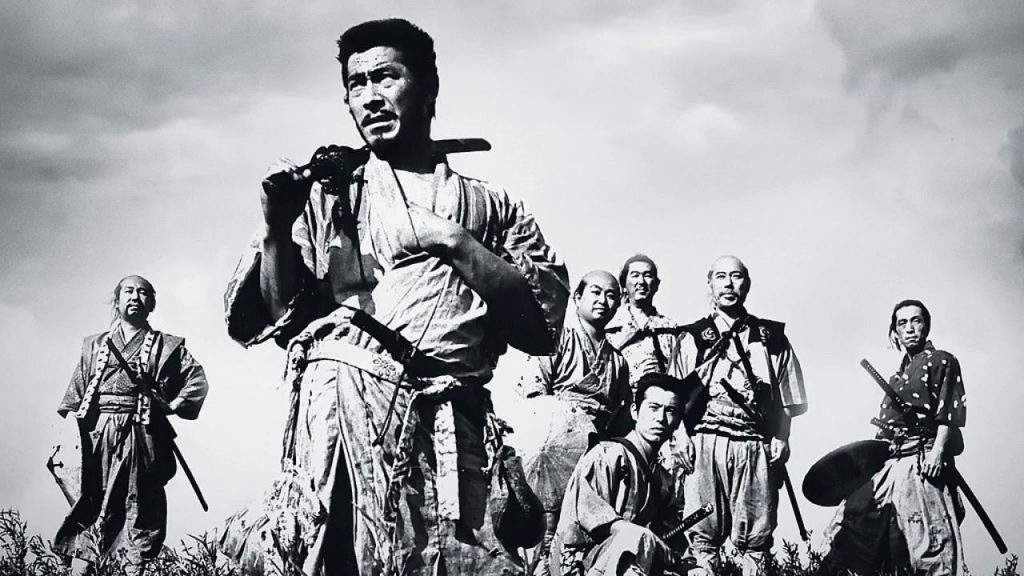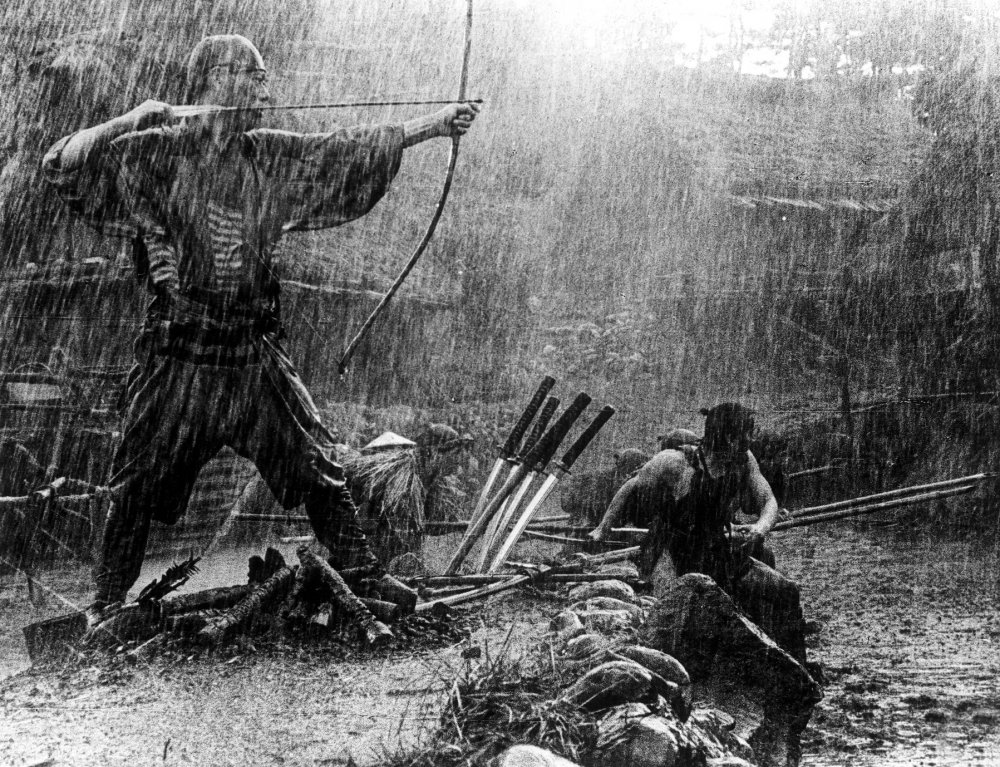Seven Samurai (1954) – Kurosawa’s Beautiful Action Epic.
1950s Japan was a very fertile period in time for movies with some of the greatest, most artistic films ever made being released. It was a time of Kurosawa, Ozu, Mifune, Honda and Mizoguchi, filmmakers whose influence has left an indelible mark on our cultural history. They introduced Japanese culture to the rest of the world, giving us everything from samurai to gigantic monsters with the minutiae of family life in between. It also marked a wider re-emergence of Japan onto the world stage after the horrors of Hiroshima and Nagasaki.
Seven Samurai stands out as one of the greatest of these movies, Kurosawa’s 3 ½ hour masterpiece about a village who hires samurai to protect them from bandits. To those who have never seen the film or would consider watching a foreign language film, they may think that the story sounds a little familiar. Hollywood has remade Seven Samurai at least four times with John Sturges’ The Magnificent Seven (1960), it’s 2016 remake, the 1980s sci-fi adventure Battle Beyond the Stars and, less obviously, John Landis’ The Three Amigos, all telling the same or at least a very similar story. It was also the first film to feature what you might call a recruitment act in which a disparate group of people are brought together to achieve a singular goal (think anything from Armageddon to Guardians of the Galaxy).
After hearing of an upcoming attack by bandits, the village elder dispatches three farmers to the town with the mission to recruit ‘hungry Samurai.’ They can’t offer money or glory, just a few meals a day as payment. The farmers are lucky as the first Samurai they recruit is Kambei Shimada, played by the wonderful Takashi Shimura, a regular in Kurosawa’s films. He is older, wiser and mindful of the injustice the villagers are suffering. He is a thinker, a Ronin (a masterless Samurai) who provides the film’s philosophical heart. He has fought in many battles and he is as much defined by his victories as he is by his losses. He fights because he must and we are introduced to him as he helps rescue a child that has been kidnapped. He doesn’t fight for glory, however and at one point proclaims, “This is the nature of war: By protecting others, you save yourselves. If you only think of yourself, you’ll only destroy yourself.”
Shimura is followed by a youngster, Katsushirō Okamoto, man child who has never been tested and Kikuchiyo, a very humorous fighter who at once belongs to the group whilst also being apart from them. Throughout the film his position as Samurai is questioned because of his lack of discipline and his individuality. He is played with a manic energy by the legendary Toshiro Mifune, another regular member of Kurosawa’s band of actors.
As more Samurai join the group we learn more about their lives and their position in society, from those who walk proudly down the streets with swords on their shoulders to those reduced to gambling and stealing from the poor. We also learn more about the farmers who, whilst feeding the Samurai their rice, are reduced to eating millet which, it is claimed, will eventually make them blind.
It is a film that is both epic and intimate at the same time and Kurosawa allows the story to develop without any hurry. That’s not to say that the film is slow, it certainly isn’t, it only means we are introduced to each character and the society in the time it takes for us to get to know them rather than rushing from set-piece to set-piece.

I first saw Seven Samurai as a teenager and I remember thinking it took an age it get going but now as an adult it seems like a very different film. What was once slow is now nuanced, layered and subtle. The Samurai are interesting people, not just ciphers, each with their own personality, background and philosophies. Although they all agree to help the farmers, their motives differ and as the film progresses, we discover much more about them. In one powerfully moving scene we get a glimpse as to how Kikuchiyo left the life of a farmer to become the man he is. Mifune tightly holds a child in a river, a building on fire behind him, he cries helplessly as the memories come flooding back. His comrades call him to hurry to safety but he can’t, he is stuck in a moment from decades passed. It is a beautiful and devastating scene that reminds us, in the chaos of battle, of the heart that has gone in to the making of this story.
The film is spilt by a musical intermission into two halves, the first chronicling the recruitment of the Samurai, the second the preparation and battle in the village. This is welcome not only because takes us from one act to another but also because it gives us the opportunity to listen to Fumio Hayasaka‘s wonderful score.
Kurosawa’s direction in the second act is exemplary and seems to mark a moment in time when action filmmaking matured. It is a thoroughly modern approach, much more so than many Hollywood films of the ’50s. The editing is fast, the camera work is precise. How many modern films have you seen in which the ultimate battle is fought in the rain? What has become a staple of modern action movie making is seen over sixty years ago, not in it’s infancy, but as a beautifully realised, incredibly well choreographed scene. Kurosawa may not have invented moments like this but, like Orson Welles with Citizen Kane, he took existing techniques and made them magical.
Cinematographer Asakazu Nakai’s camera work is gorgeous with scene after scene worthy of admiration. One particular moment of beauty is when Shinto, a Farmer’s daughter, and Katsushirō find brief romantic respite in a shed illuminated by an outdoor fire. This is just one moment in many; the epic battle in the rain, the village at night, the grave mounds on top of the hill. It is tempting to just pause the image for a moment and marvel at as you would a piece of art in a museum.

The final scene is one of triumph and sadness. As Kambei Shimada points out, “The farmer’s have won, not us.”
Apparently the producer of Seven Samurai was not at all pleased with the final outcome and wanted to have his name taken off it. When he discovered a copy had been taken out of Japan and was put into competition at the Venice Film Festival he was livid. However, after the film won the top prize he quickly changed his mind and insisted his name should remain.

Seven Samurai is an important entry in film history because of it’s inventive use of deep focus lenses, the action sequences which are exquisitely photographed and edited and also because of the door it helped open for Japanese cinema to the world but also because it is thoroughly entertaining. There are many films which are labelled masterpieces many of which do not deserve the accolade, however there is little doubt of the legitimacy of Seven Samurai‘s entitlement to such praise.
Film ‘89 Verdict – 10/10

